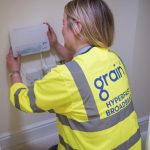Openreach Launch Trial to Help UK Telecare Users Switch to IP Phone

Network provider Openreach (BT) has informed ISPs that they’re launching a new ‘Prove Telecare’ trial (SVR – Site Visit Reason), which is designed to help UK consumers with old analogue based phone (PSTN / WLR) and Telecare systems to safely migrate to modern broadband (FTTP and FTTC / SOGEA) connections with IP phone (VoIP) services.
In case anybody overlooked it. BT and Openreach recently delayed their planned switch-off of copper-based analogue line services (PSTN phones and WLR) from the end of December 2025 to 31st January 2027 (here and here) in order to give broadband ISPs, Telecare providers and vulnerable users time to adapt.
The delay to the industry-led migration had been expected (here), due primarily to the fact that it was deemed to be putting a lot of Telecare users at risk (i.e. vital health / medical monitoring services for vulnerable and seriously ill people). The main problem being that a lot of the older systems aren’t compatible with modern Internet Protocol (IP / VoIP) based phone services. Not to mention that, without battery backup, they may cease to function during a power outage.
Advertisement
The issue of poor telecare support is largely the fault of telecare and alarm providers (i.e. failing to upgrade their systems), but this doesn’t change the reality that nearly 2 million people use these vital systems in the UK. Often such users exist in rural and isolated areas, where mobile services may also go down during power cuts. Ofcom are separately reviewing mobile resilience, but that’s another matter.
Network operators, ISPs and telecare providers are now working more closely together to introduce solutions to help tackle the issue, one of which is reflected in Openreach’s new Prove Telecare Trial. The small volume field engineering trial, which is due to start on 30th July and run until 22nd October 2024, is designed to support ISPs and customers to “safely migrate” their fixed line telecare devices to SOGEA (FTTC) and FTTP (full fibre) broadband lines with IP voice services.
Openreach Statement
The trial will test the systems, engineering training, on the day processes and procedures associated with moving end customers’ fixed voice telecare device(s) safely to new IP broadband and VoIP services.
To participate in the trial, a CP must confirm that it has agreements in place with telecare providers in the trial areas of Cardiff, North Yorkshire and Lambeth & Southwark to ensure that the telecare provider can arrange for a telecare engineer to be present with an Openreach engineer at the migration appointment. This will ensure that the end customer is always left with a working telecare service.
The trial service will attract an extra charge of £34 +vat, although it remains to be seen whether this is something that retail broadband and phone providers will pass on to related customers. But otherwise, this is a very positive approach and one that will no doubt help to tackle the issue, provided there are enough resources available to deliver it at scale, nationally.
As above, the trial is currently very small and only covering a few limited parts of England and Wales, but in the future it could be expanded. Time will tell. Openreach and BT are separately also piloting a new SOTAP for Analogue product (here), which is a phone line service that does NOT require broadband to work and can harness modern networks to function like the older analogue service.
Advertisement
Mark is a professional technology writer, IT consultant and computer engineer from Dorset (England), he also founded ISPreview in 1999 and enjoys analysing the latest telecoms and broadband developments. Find me on X (Twitter), Mastodon, Facebook, BlueSky, Threads.net and Linkedin.
« CEO of UK ISP Zen Internet Talks Alternative Broadband Networks






















































By my calculation, BT and Openreach have delayed the switch off by 13 months. i.e. a one year delay plus one month to move it to a more sensible date.
Openreach announced this circa 2016-17. 8 years should be enough notice for anyone.